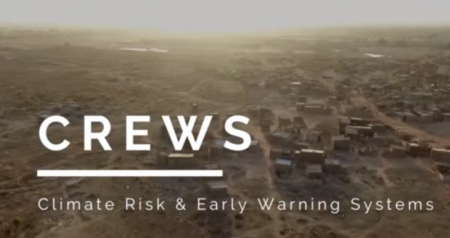
CREWS early warning initiative expands
GENEVA, 18 June, 2018 - An international initiative to improve early warning systems against extreme weather and support climate change adaptation is gaining momentum to protect more people in more places. Financing has been extended to cover the Caribbean and West African regions.
The Climate Risk and Early Warning Systems (CREWS) initiative, launched in 2015, has been operating in 19 countries in Africa and the Pacific. It is improving early warning systems to protect the most vulnerable populations against hazards like tropical cyclones and floods in least developed countries and small island developing states.
“This international initiative is reaching out to exposed populations in order to strengthen awareness, save lives and reduce the impact of extreme weather and climate-related disasters. Early warning systems are an essential part of climate change adaptation,”” said Brigitte Collet, France’s Ambassador for Climate Change Negotiations, Renewable Energy and Climate Risk Prevention.
Ms Collet chaired a CREWS Steering Committee meeting, held on 14 June, to review ongoing activities and approve future projects. The committee discussed the findings of a report about lessons learned from the devastating 2017 hurricane season. The final report will be published this week at the Americas Regional Platform for Disaster Risk Reduction in Cartagena, Colombia. It identifies how to enhance the early warning systems and increase preparedness of Caribbean communities for the 2018 season and highlight in particular how men and women were affected differently by events.
“Most least developed countries and many small island developing states have inadequate weather observation networks and only a basic early warning system. The World Meteorological Organization is striving to close the capacity gap on weather, climate and water services by scaling up effective partnerships for investment in support of climate change adaptation, disaster risk reduction and sustainable development. CREWS embodies that ambition,” said WMO Secretary-General Petteri Taalas.
UN Special Representative for Disaster Risk Reduction, Ms. Mami Mizutori, said: "Tragically lives continue to be lost in disasters because of lack of access to early warning systems. Timely, actionable warnings and access to information are key to reducing loss of life and minimizing the impact of disasters on people's health and safety."
The Sendai Framework for Disaster Risk Reduction 2015-2030, the global plan for reducing disaster losses, includes a specific target for improving access to multi-hazard early warning systems.
CREWS is being rolled out in a number of African countries. In the Democratic Republic of Congo, Burkina Faso, Mali and Niger, CREWS is supporting the improvement of operational hydro-meteorological forecasts and early warning services, with an emphasis on flood and drought-related risks.